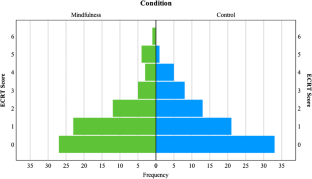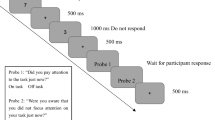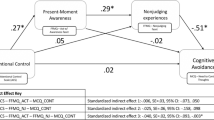Abstract
Objectives
Cognitive decoupling (the ability to distinguish supposition from belief and run thought experiments) is considered one of the key mechanisms in mindfulness, cognitive reflection and reasoning. Therefore, the present study examined whether a brief mindfulness exercise that explicitly encourages cognitive decoupling can increase cognitive reflection and reasoning.
Methods
A total of 156 first- and second-year undergraduate students were randomly allocated to either a mindfulness or control condition, before listening to a 15-min audio recording. The mindfulness audio was a recording of the leaves on a stream exercise that focussed on how to dissociate from thoughts (decentring), whereas the control audio was a recording of a book prologue. Cognitive reflection and reasoning were measured through the expanded cognitive reflection test and a syllogistic reasoning test, both of which encourage an incorrect automatic response rather than a correct rational response. The five-facet mindfulness questionnaire-short form and the rational-experiential inventory were also administered as trait measures of mindfulness and thinking style (intuitive or rational), respectively.
Results
The results showed no significant difference between the mindfulness and control conditions on either of the cognitive tests. However, there was a significant positive correlation between trait mindfulness and trait rationality (r = 0.56). Further analyses showed that the mindfulness subscales of observing, describing, detaching, and acting mindfully were all significant predictors of trait rationality.
Conclusions
Trait mindfulness and trait rationality are moderately associated, although more research is required to determine whether mindfulness training can increase cognitive reflection and reasoning.



Similar content being viewed by others
Data Availability
The data for the study is available from the first author on request.
References
Alhola, P., & Polo-Kantola, P. (2007). Sleep deprivation: Impact on cognitive performance. Neuropsychiatric Disease and Treatment, 3(5), 553–567.
Bergomi, C., Tschacher, W., & Kupper, Z. (2013). The assessment of mindfulness with self-report measures: Existing scales and open issues. Mindfulness, 4, 191–202.
Bishop, S. R., Lau, M., Shapiro, S., Carlson, L., Anderson, N. D., Carmody, J., Segal, Z. V., Abbey, S., Speca, M., Velting, D., & Devins, G. (2004). Mindfulness: A proposed operational definition. Clinical Psychology: Science and Practice, 11(3), 230–241.
Bohlmeijer, E., ten Klooster, P. M., Fledderus, M., Veehof, M., & Baer, R. (2011). Psychometric properties of the Five-Facet Mindfulness Questionnaire in depressed adults and development of a short form. Assessment, 18(3), 308–320.
Brañas-Garza, P., Kujal, P., & Lenkei, B. (2019). Cognitive reflection test: Whom, how, when. Journal of Behavioral and Experimental Economics, 82, 101455. https://doi.org/10.1016/j.socec.2019.101455.
Carmody, J., & Baer, R. A. (2008). Relationships between mindfulness practice and levels of mindfulness, medical and psychological symptoms, and well-being in a mindfulness-based stress reduction program. Journal of Behavioral Medicine, 31(1), 23–33.
Chiesa, A., Calati, R., & Serretti, A. (2011). Does mindfulness training improve cognitive abilities? A systematic review of neuropsychological findings. Clinical Psychology Review, 31, 449–464.
Donald, J. N., Atkins, P. W. B., Parker, P. D., Christie, A. M., & Ryan, R. M. (2016). Daily stress and the benefits of mindfulness: Examining the daily and longitudinal relations between present-moment awareness and stress response. Journal of Research in Personality, 65, 30–37.
Evans, J. S. B. T., & Stanovich, K. E. (2013). Dual-process theories of higher cognition: Advancing the debate. Perspectives on Psychological Science, 8(3), 223–241.
Evans, J. S. B. T., Barston, J. L., & Pollard, P. (1983). On the conflict between logic and belief in syllogistic reasoning. Memory & Cognition, 11(3), 295–306.
Fleming, S. M., Dolan, R. J., & Frith, C. D. (2012). Metacognition: Computation, biology, and function. Philosophical Transactions of the Royal Society London. Series B, Biological Sciences, 367(1594), 1280–1286.
Fraser-Mackenzie, P. A. F., & Dror, I. E. (2011). Dynamic reasoning and time pressure: Transition from analytical operations to experiential responses. Theory and Decision, 71(2), 211–225.
Germer, C. K., Siegel, R. D., & Fulton, P. R. (2005). Mindfulness and psychotherapy. New York: Guilford Press.
Hayes, S. C., & Smith, S. (2005). Get out of your mind & into your life: The new acceptance and commitment therapy. Oakland: New Harbinger Publications, Inc..
Hopthrow, T., Hooper, N., Mahmood, L., Meier, B. P., & Weger, U. (2017). Mindfulness reduces the correspondence bias. The Quarterly Journal of Experimental Psychology, 70(3), 351–360.
Jaeger, T. F. (2008). Categorical data analysis: Away from ANOVAs (transformation or not) and towards logit mixed models. Journal of Memory and Language, 59(4), 434–446.
Jankowski, T., & Holas, P. (2014). Metacognitive model of mindfulness. Consciousness and Cognition, 28, 64–80.
Johnson, S., Gur, R. M., David, Z., & Currier, E. (2013). One-session mindfulness meditation: A randomized controlled study of effects on cognition and mood. Mindfulness, 6(1), 88–98.
Juanchich, M., Sirota, M., & Bonnefon, J. F. (2019). Anxiety-induced miscalculations, more than differential inhibition of intuition, explain the gender gap in cognitive reflection. Journal of Behavioural Decision Making. https://doi.org/10.1002/bdm.2165.
Kabat-Zinn, J. (1994). Wherever you go, there you are: Mindfulness meditation for everyday life. London: Piatkus.
Kang, Y., Gruber, J., & Gray, J. R. (2013). Mindfulness and de-automatization. Emotion Review, 5(2), 192–201.
Khoury, B., Knäuper, B., Schlosser, M., Carrière, K., & Chiesa, A. (2017). Effectiveness of traditional meditation retreats: A systematic review and meta-analysis. Journal of Psychosomatic Research, 92, 16–25.
Mahmood, L., Hopthrow, T., & de Moura, G. R. (2016). A moment of mindfulness: Computer-mediated mindfulness practice increases state mindfulness. PLoS One, 11(4). https://doi.org/10.1371/journal.pone.0153923.
Manuello, J., Vercelli, U., Nani, A., Costa, T., & Cauda, F. (2015). Mindfulness meditation and consciousness: An integrative neuroscientific perspective. Consciousness and Cognition, 40, 67–78.
Mega, L. F., & Voltz, K. G. (2014). Thinking about thinking: Implications of the introspective error for default-interventionist type of models of dual processes. Frontiers in Psychology, 5, 864.
Mellinger, D. I. (2010). Mindfulness and irrational beliefs. In D. David, S. J. Lynn, & A. Ellis (Eds.), Rational and irrational beliefs: Research, theory, and clinical practice (pp. 219–249). New York: Oxford University Press, Inc..
Nisker, W. (1998). Buddha’s nature: Evolution as a practical guide to enlightenment. New York: Bantam Books.
Noone, C., & Hogan, M. J. (2018). A randomised active-controlled trial to examine the effects of an online mindfulness intervention on executive control, critical thinking and key thinking dispositions in a university student sample. BMC Psychology, 6(1), 13.
Noone, C., Bunting, B., & Hogan, M. J. (2016). Does mindfulness enhance critical thinking? Evidence for the mediating effects of executive functioning in the relationship between mindfulness and critical thinking. Frontiers in Psychology, 6, 2043.
Pacini, R., & Epstein, S. (1999). The relation of rational and experiential information processing styles to personality, basic beliefs, and the ratio-bias phenomenon. Journal of Personality and Social Psychology, 76(6), 972–987.
Pepping, C. A., O’Donovan, A., & Davis, P. J. (2013). The positive effects of mindfulness on self-esteem. The Journal of Positive Psychology, 8(5), 376–386.
Preiss, D. D., Castillo, J. C., Flotts, P., & San Martín, E. (2013). Assessment of argumentative writing and critical thinking in higher education: Educational correlates and gender differences. Learning and Individual Differences, 28, 193–203.
Schreiner, I., & Malcolm, J. P. (2008). The benefits of mindfulness meditation: Changes in emotional states of depression, anxiety, and stress. Behaviour Change, 25(3), 156–168.
Schuhfried (n.d.). Schuhfried: HCTA Halpern Critical Thinking Assessment. Retrieved from https://www.schuhfried.com/test/HCTA.
Sirota, M., Kostovičová, L., Juanchich, M., Dewberry, C., & Marshall, A.C. (2018). Measuring cognitive reflection without maths: Developing and validating the verbal cognitive reflection test. Manuscript submitted for publication.
Sladek, R. M., Bond, M. J., & Phillips, P. A. (2010). Age and gender differences in preferences for rational and experiential thinking. Personality and Individual Differences, 49, 907–911.
Smith, A. (2002). Effects of caffeine on human behavior. Food and Chemical Toxicology, 40, 1234–1255.
Šrol, J. (2018). Dissecting the expanded cognitive reflection test: An item response theory analysis. Journal of Cognitive Psychology, 30(7), 643–655.
Titmuss, C. (2014). Mindfulness for everyday living: Discover how to transform your life with the power of mindfulness. London: Bounty Books.
Tolkien, J. R. R. (2005). The lord of the rings. London: HarperCollins.
Toplak, M. E., West, R. F., & Stanovich, K. E. (2014). Assessing miserly information processing: An expansion of the Cognitive Reflection Test. Thinking & Reasoning, 20(2), 147–168.
Weger, U. W., Hooper, N., Meier, B. P., & Hopthorw, T. (2012). Mindful maths: Reducing the impact of stereotype threat through a mindfulness exercise. Consciousness and Cognition, 21(1), 471–475.
Funding
This study was funded by a Doctoral Research Scholarship awarded by City, University of London.
Author information
Authors and Affiliations
Contributions
STF: designed and executed the study, performed part of the date analysis and wrote the first draft of the manuscript. KY: assisted with the data analysis, wrote part of the results and edited the final manuscript. KT: collaborated with the design of the study and edited the final manuscript. All authors approved the final version of the manuscript for submission.
Corresponding author
Ethics declarations
Conflict of Interest
The authors declare that they have no conflict of interest.
Ethical Approval
All procedures performed in studies involving human participants were in accordance with the ethical standards of the British Psychological Society and with the 1964 Helsinki declaration and its later amendments or comparable ethical standards. Ethical approval was granted by the Psychology Department Research Ethics Committee at City, University of London.
Informed Consent
Informed consent was obtained from all individual participants included in the study.
Additional information
Publisher’s Note
Springer Nature remains neutral with regard to jurisdictional claims in published maps and institutional affiliations.
Electronic supplementary material
ESM 1
(DOCX 12 kb)
Rights and permissions
About this article
Cite this article
Farrar, S.T., Yarrow, K. & Tapper, K. The Effect of Mindfulness on Cognitive Reflection and Reasoning. Mindfulness 11, 2150–2160 (2020). https://doi.org/10.1007/s12671-020-01429-z
Published:
Issue Date:
DOI: https://doi.org/10.1007/s12671-020-01429-z




